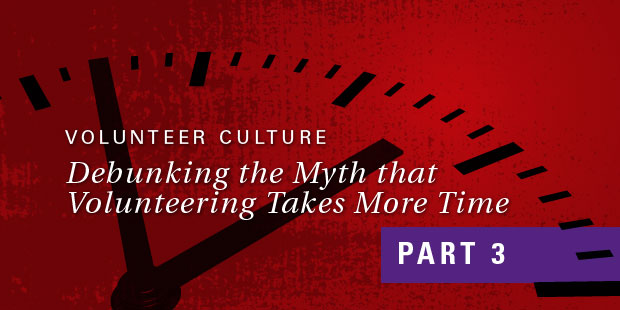
Volunteer Culture: Debunking the Myth that Volunteering Takes More Time – Part 3
When your church decides to intentionally develop a culture where it’s normal to volunteer, where it’s natural to serve, it’s easy to make it all about the task. And when it’s all about the task, we can make it all about our church. It’s all too easy to forget that it’s first about Jesus and people. I know – shocking. Earth-breaking. But true. Here are a couple examples.
- The objective, the task alone drives the recruitment of volunteers.
- Often churches look at the ministry goals in front of them and go into recruitment mode to get the task of ministry done. And why not? We do have a mission. We have an agenda. There are clear goals with distinctive objectives that must be accomplished. However, even with clear vision cast, the task shouldn’t be the lone motivator for inviting people to serve.
- People matter. Inviting them to serve is an opportunity to invest in their personal development, their spiritual growth. Their participation on the team should encourage new friendships, invitations to take steps in their journey, and constant learning to live out the character of Christ as a servant.
- Make it normal for people to connect outside of their serving time. Time to share a meal, play a game, enjoy worship, just be.
- Encourage conversation beyond the task: what are some steps toward Jesus we can take together as a team? What is God up to in our personal journys? Provide space for that dialog.
- Create intentional systematic ways to share prayer concerns. Follow up with cards, phone calls and emails. Build a culture of care in your serving environments.
- Leaders appear arrogant about their church.
- Sometimes our promotion of our teams, our ministry objectives, our volunteer opportunities can sound like they are somehow more important to the kingdom than the volunteering our people are already doing in their kid’s school, their neighborhood association, the Red Cross or the community soup kitchen.
- This past week I learned of another woman in our church who I didn’t know as a volunteer. She wasn’t part of any team. She didn’t appear to have lifted a finger to help our ministry. I was so wrong. Since being diagnosed 10 years ago with cancer, the local oncology clinic has called on her to sit with, listen to, provide encouragement to new patients who’d learned they have cancer. She’s been pulling people back from the edge of hopelessness for the past decade. She’s loved like Jesus, prayed with people, shared scripture and hugged new friends. She has volunteered her time. She’s given her life. That counts for the Kingdom. It is the Kingdom.
Recap:
- Invest in people; don’t merely expect them to invest in your ministry.
- Celebrate every expression of servanthood for the Kingdom – even if it’s not in your local ministry.
More from Mark Waltz here.

Tags: Mark Waltz, Serve, Volunteer Culture












